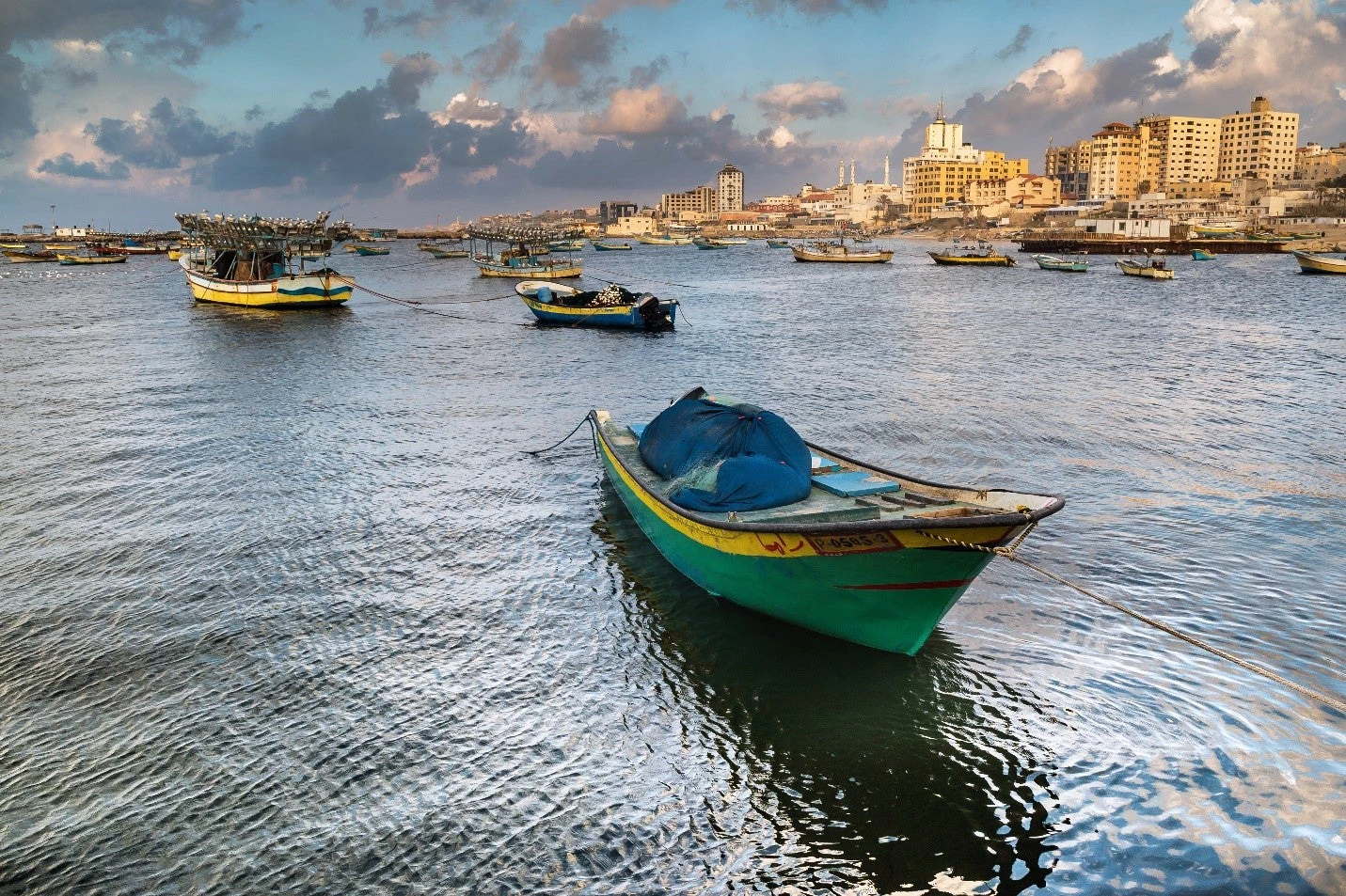 Bateaux de pêche dans la bande de Gaza. Photo : Shutterstock.com
Bateaux de pêche dans la bande de Gaza. Photo : Shutterstock.com
Fish is often on the dinner tables in Gaza, where families have long depended on the Mediterranean Sea for their livelihoods. But in recent years, this traditional way of life has been under threat.
In February 2020, we had the welcome opportunity to speak with stakeholders in the sector, many of whom participated in the Fisheries Workshop facilitated by the World Bank. Fishermen, retailers, restaurant owners, hatchery operators, fish transporters, scientists, officials, and representatives from NGOs discussed the challenges and the decline of Gaza’s fishery. They also discussed their desire to reinvigorate the sector through the better management of its resources, improved value chains, and the expansion of aquaculture. Together, these pillars of sustainable fisheries management can foster food security, while creating more jobs and income.
The Mediterranean Sea has long been a lifeline for the almost 2 million people who live in the Gaza Strip. Fishing is a vital source of employment, with more than 100,000 people benefiting from the sector. Still, the sea is not as bountiful as it once was—a sentiment we heard often. The people of Gaza cannot depend on, or at times even afford, their own fish. Most fishing families are poor, and their income is becoming increasingly unreliable as marine ecosystems continue to degrade.
The “Rapid Fishery and Aquaculture Sector Diagnosis Using Fishery Performance Indicators in the Gaza Strip,” a report recently conducted by the World Bank with funding from PROBLUE, gives us a critical snapshot and baseline of the sector. The good news is that Gaza has a fairly well-organized fishery sector, with entrepreneurs emerging in the aquaculture sub-sector. However, its marine ecosystems are degraded, fishing equipment and landing sites are in disrepair, and many of the fish that people depend on are already overexploited.
Gaza’s fishing community is among the poorest, with unique challenges
We found some challenges that are unique to Gaza, where the unemployment rate was 45 percent in 2019. Some fishermen told us that, more and more, they are finding raw and untreated sewage in their nets. Another issue is the limited power supply and frequent blackouts. Unique, long-term issues involve the lack of mobility and fluctuating fishing zones due to restrictions in times of conflict.
More typical challenges include obsolete equipment and an inability to access markets, all of which could worsen in the short-term during the global Coronavirus pandemic.
Yet in terms of COVID-19 economic recovery, fisheries offer an entry point for development partners to support community-driven development, beginning with technical assistance and social safety nets targeting the poorest and most vulnerable.
The World Bank diagnostic report also found that the marine ecosystem on the Gaza Strip overall has degraded to the point that it requires urgent attention. The discharge of untreated—or partially treated—sewage into the seawater from wastewater treatment plants harms biodiversity in the marine environment and threatens public health. Sewage is harming the ecological balance between fish, zooplankton, phytoplankton and macroalgae, as well as their habitats.
Fish are lost in the post-harvesting work as well, due to limited handling techniques, ill equipped landing sites and processing facilities, a serious lack of storage, and fragmented cold chains. Ports are not equipped with sanitary handling facilities nor refrigerated warehouses. Fishers are forced to sell the poorly handled fish at a lower price. If captured and harvested, fish can be better preserved and processed, they can be sold at a higher price—leading to improved incomes and more jobs.
Given the constraints on the fishing zones and logistical challenges, solutions to these issues will require innovations with a great deal of flexibility. The consultation workshop in February 2020 provided an opportunity for a dialogue among stakeholders. We hope that these conversations continue to build momentum toward best practices, including marine fish farming that thrives regardless of constraints on the fishing zones. Our report also recommends stronger coordination and consultation among the different stakeholders and various associations on an ongoing basis.
Aquaculture development can bring more jobs to the Gaza Strip
First and foremost, Gaza needs more jobs. Aquaculture represents a new and profitable subsector to Gaza fisheries. Some fish farming businesses are thriving, with strong potential to attract more private investors. Inland Tilapia farming has the longest history in the Gaza Strip and has had some promising yields in small ponds and irrigation systems. The Palestinian Authority is interested in expanding these techniques to the West Bank as well. An innovative type of marine cage aquaculture project—designed to meet the needs of the Gaza fishing community—is also underway in the Mediterranean with the support of the UN’s Food and Agriculture Organization (FAO) and the government of Italy.
Gaza scientists have fostered innovation in the aquaculture subsector, in part due to a chronic lack of fish feed. A recent study found that using citrus peelings, such as orange peel, in the feed can increase the nutritional absorption of some Tilapia and could be used as a growth promoter.
There are already some successful aquaculture firms charting a course for growth. Gaza will need to continue to build its fish farming subsector on the sea, as well as inland, with the aim of creating a 21st century aquaculture infrastructure that produces jobs and generates better incomes for their communities.
For further reading, check out the World Bank page on Oceans, Fisheries, and Coastal Economies and the latest blog on the World Bank MENA Blue Program to save coasts in the region.



Join the Conversation